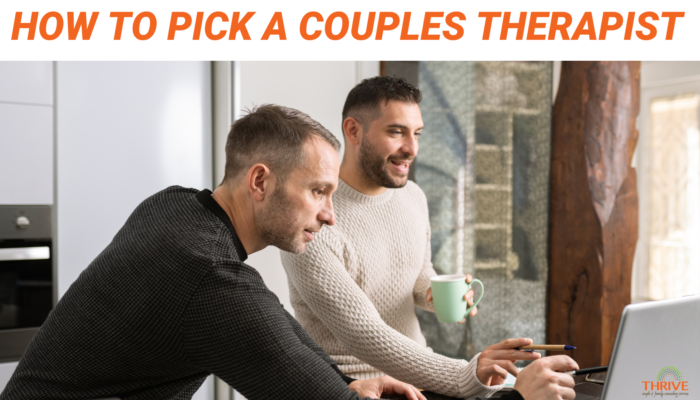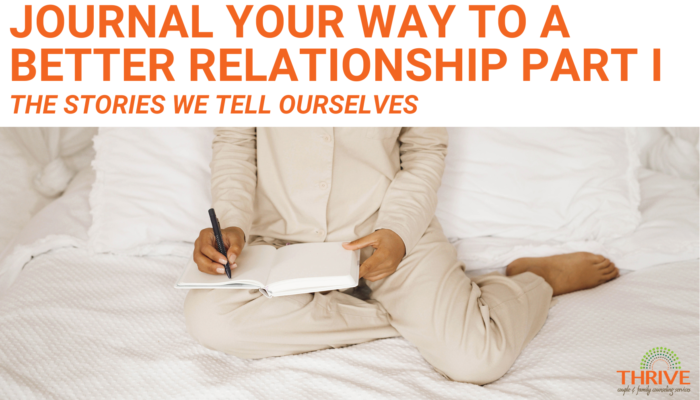So you already did the hard part—you decided you and your partner are ready to start couples counseling. Bravo! Deciding you are ready to get help is a courageous step. Beyond that, many couples don’t know how to pick a couples therapist to help their relationship.
Okay, we’re actually doing this…now what?
For many people, finding a couples therapist starts with a Google search. This can pull up a vast array of helping professionals. Before you are enticed by a fancy website and make a decision based on that, there are a few more crucial factors to consider. Like any type of research, it is hugely important to verify the source when you pick a couples therapist.
So, how should we pick a couples therapist?
First, find someone who specializes in what you need! With your most important relationship at stake, you want to find someone who really knows how to help couples!
Just like you wouldn’t want to see a pediatrician to perform a heart surgery on you, you want to see someone who spends the vast majority of their work helping couples just like you overcome relationship challenges and heal their (emotional) hearts.
Beyond specializing in couples therapy, you may also have specific areas of need. Find a therapist who is passionate about helping with these sub-specialties:
- Improving sexual connection
- Healing from affairs or other kinds of broken trust
- Parenting challenges, or becoming new parents
- Getting along with in-laws or extended family
- Adjusting to cultural or religious differences
- Stay or go – couples in crisis
- Couples who work together
- Second marriages or blended families
There is no regulation of the term “couples therapy.” This means that straight out of graduate school, any mental health professional pursuing a license may market themselves as providing couples therapy. For this reason it is extremely important you do your research!
Working with couples or families requires special training. Many graduate degree programs have specific coursework tracks to prepare students to work with more than one person in the room. It is essential that your therapist has learned to understand and help both of you with your interactions and dynamics.
What works for individuals may not work in the chaos of a couple’s relationship. Therapists must learn to validate and help one person, while still maintaining attention and a good rapport with the other person in the room. Through couples therapy coursework and certifications, clinicians can learn how to manage all of these factors at play, while using basic counseling skills.
Just like the difference between an individual music lesson teacher and a director of an orchestra—while they both may have similar knowledge about music and instruments, one is trained to help one student and their instrument, while the other meets the needs of several unique instrumentalists simultaneously. Similar knowledge; different skills.
When couples call our practice (303-513-8975, X1), we love to help you pick the best couples therapist for you! Our knowledgeable counselor matching specialist Joanne will learn about you, your goals for couples therapy, your schedule availability, and then help you get set up with the best Englewood, CO couples counseling for your needs.
A Key Factor When You Pick a Couples Therapist
Also, research says that success in ALL types of counseling hinges on one major factor – Do I like this person?
When you start couples therapy, you will be letting this person into your heart and family. Do you feel comfortable and safe with them? Do they have a sense of humor? Can they help you feel welcomed and at-ease? If you can get a sense that the answer may be yes to these questions, you are off to a great start to pick a couples therapist!
How do they help couples?
Additional good questions to ask yourself as you research to help you pick a couples therapist are:
- How much advanced training does this person have in helping couples specifically?
- How much of their practice are marriage and couples therapy clients?
- Do they love to help couples overcome relationship challenges?
- Do they have a methodology they use to help you overcome common couple challenges?
- Is there a process they will be using (the roadmap), or are they going to be winging it?
- Does their methodology have any research to show it is successful in helping couples heal their relationships?
When we help couples in our Denver Tech Center Couples Counseling practice, we all specialize in couples therapy, and have advanced training in Emotionally Focused Couples Therapy, the most effective model of couples therapy, according to many research studies, and attachment research.
We are very proud to call ourselves Emotionally Focused Couples Therapists because of the solid research behind our methodology, and because we witness the amazing transformations couples make with our own eyes. As a bonus, our own relationships and lives are enriched by understanding the science of love and relationships through Emotionally Focused Therapy. We have the passion, the focus, the roadmap to help you achieve your goals in your relationship. We would love to help YOU!
But what about years of experience?
Years of experience can be a very vague marker. Just because a clinician has been practicing “for over 20 years” does not necessarily mean that they have been working with couples that whole time. This also does not mean that they were using a certified or evidenced-based method of couples therapy with their clients, or that they were receiving ongoing continuing education or supervision.
What do the letters behind their name mean?
These are the credentials which represent the training, certification or education an individual has obtained. It’s important when you’re finding the right therapist that you look for credentials that fit with your needs.
Here are a few common ones:
Education
BA/BS This represents Bachelors of Arts or Bachelors of Science. This is an undergraduate degree and unless otherwise specified could be in any major and on its own, does not qualify someone to practice clinical therapy.
M.Ed/MS This represents Masters of Education or Masters of Science. A degree of this level and in the mental health field is necessary and sufficient for licensure.
PhD/PsyD This stands for doctorate of philosophy or Doctor of Psychology. While counseling is a master’s level position, the highest degree you can obtain would be a doctorate. Often this is used for teaching or publishing research.
**It is important to note, these degrees can be in any field. Just because the clinician has a masters or PhD does not mean it is in a therapy-related field. There are even some degrees like DCH (Doctorate of Clinical Hypnotherapy), which are not accredited in the United States or the American Psychological Association. In short, do your research!
Licensure
LPCC/LPC This stands for Licensed Professional Counselor Candidate or Licensed Professional Counselor. A candidate has completed all their requirements for licensure and is now just accruing the necessary experience hours (kind of like a residency for doctors). The education for this licensure covers a broad range of psychological and social development issues and helping coping skills. They are broadly trained to work with individuals, couples, and families.
LSW This stands for Licensed Social Worker. These licensees learn a lot about macro systems and how to connect others to community resources in addition to some basic counseling skills. This license can be obtained with an undergraduate Bachelor’s degree.
LCSW This stands for Licensed Clinical Social Worker. This is the most advanced social work license, which requires at least a Masters degree and far more clinical experience hours.
LMFT This stands for Licensed Marriage and Family Therapist. Clinicians with this training use a systems approach to work specifically with couples and families. This licensure requires the majority of their experience hours to be with couples or families.
PhD/PsyD Are eligible to become Licensed Psychologists. Licensed PhDs sometimes focus more on formal mental health assessments, while PsyDs sometimes focus more on direct clinical work with clients or patients.
**It is important to note, all of these licensees are trained in basic counseling and helping skills and could be qualified to work with a couple or family. To ensure your therapist has this ability, you would want to learn what subject their educational degree and certifications are in.
Certification
NCC This stands for National Certified Counselor. This means a clinician has maintained continuing education hours and met the high national standards to practice counseling.
LAC This stands for Licensed Addictions Counselor.
CSAT This stands for Certified Sex Addiction Therapist.
AASECT Certified Sex Therapist This stands for the American Association of Sexuality Educators, Counselors and Therapists. These clinicians are rigorously trained and extensively educated to work with clients with specific sexual issues and concerns.
Certified EFT This stands for Certified Emotionally Focused Couples Therapist. These clinicians use an attachment style approach to help couples form a stronger more secure bond. EFT has the most positive outcome results in studies of any type of couple’s therapy.
Gottman Trained This is another rigorous certification process for clinicians working with couples. Gottman trained therapists require much training and supervision in order to don this title. Various levels of this training can be achieved.
As you can see, a therapist’s credentials can be a mixture of experience and education. When trying to make a decision it’s best to look at the whole picture or cluster of experiences rather than one acronym.
We’re ready; let’s do this!
If you and your partner want to get your relationship back on track, or prevent problems in the first place, schedule with one of our experienced couple’s specialists at Thrive Couple & Family Counseling Services, schedule an appointment at 303-513-8975 or online:




